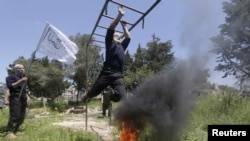From the outside, the Syrian opposition group Harakat Hazm seemed like the perfect candidate for the CIA’s covert program to train and arm moderate rebels.
The group, whose name means “Movement of Steadfastness” was secular, well-organized and dedicated to bringing down the government of Bashar al-Assad to “restore the freedom and dignity of the Syrian people.”
In the spring of 2014, Harakat Hazm was given 50 TOW anti-tank missiles. In addition, the U.S. provided the rebels with salaries, medical supplies and ammunition, but never enough, rebels said.
The episode is an example of the Obama administration’s apprehensions about supporting the fragmented rebel groups in Syria.
The U.S. is concerned that arms could end up in the wrong hands - something that has already ocurred with some military aid.
And, if Assad were ever ousted, U.S. officials worry American involvement could inadvertently lead to radical Islamic groups gaining power – something the U.S. finds more intolerable than the Assad regime.
“When we removed dictators in Iraq and Libya, we simply facilitated the rise of Al Qaida, and that’s why we have supported dictators throughout the Middle East for forty years — because we don’t want Islamists to take over,” Joshua M. Landis, Director of the Center for Middle East Studies at the University of Oklahoma told VOA last year.
Robert S. Ford, a senior fellow at the Middle East Institute (MEI) and former U.S. Ambassador to Syria, recalls the many dilemmas. He met with a Harakat Hazm representative who came to Washington that November, seeking greater White House support.
“He told us that the support the Americans gave was roughly 18,000 bullets a month,” Ford said. “Now, I’m not a military guy. I’m an economist. So I asked him, ‘That sounds like a lot. How much is it?’
“He said, ‘Well, a normal fighter in the middle of combat might use up to a hundred rounds a day,’” Ford recalled.
Ford did the math.
“At that rate, we would have been able to supply ten fighters for about 18 days,” he said. “That’s not very serious support.”
Gains by Nusra
In the fall of 2014, Harakat Hazm suffered a series of defeats by the al-Qaida-linked Nusra Front in Idlib, seizing some U.S.-supplied weapons. Washington’s worst fears realized, it stopped delivering arms to the group.
It is a move that Ford views as regrettable, as it left the rebels little alternative but to seek support elsewhere.
He said it came as no surprise to him when in March Harakat Hazm announced it was disbanding to join a larger rebel alliance, Jabhat al-Shamiyah, “Shamiyah Front,” which includes Islamists among its ranks.
Jennifer Cafarella, an analyst at the Institute for the Study of War, says this is only one example of a growing trend in Syria.
“What we have witnessed is that as the opposition has fragmented in the aftermath primarily of the Syrian gas-chemical weapons attack on Damascus by the Assad regime in August 2013,” she said.
In the wake of that attack, moderate rebel forces did not receive the international assistance they had hoped for.
That only empowered Islamist groups and encouraged them to cooperate with al-Qaida’s Nusra Front, the only party they deemed strong enough to help take down the Assad regime.
This in turn emboldened the Nusra Front to directly target moderate rebels who might side with the West to defeat the Islamist group.
“So the decision by the Hazm movement to absorb into an Islamist group was the result of Nusra deliberately targeting that group in an attempt to force it to disband,” Cafarella said. “And those moderate rebel forces sought refuge in the only option they had left.”
Central command needed
One hundred twenty-three U.S. soldiers – and weapons – arrived in Turkey last week to launch a new effort to train and equip moderate Syrian rebels to fight against IS. The White House has committed a total of $500 million to train and arm 5,000 non-militant rebels a year for three years –15,000 in all.
So far, however, the U.S. has vetted only about 400 rebels, hardly enough to make much of a difference, say analysts, especially at the rate at which IS is expanding.
“What needs to happen is that the train and assist mission needs to increase in volume,” Cafarella said. “And I think it also needs to speed up.”
Most importantly, she said, the U.S. needs to offer rebels on the ground enough incentive to break away from the Nusra Front and other elements “we wouldn’t wish to see participate in an eventual solution to the conflict.”
But throwing money and arms at non-jihadist groups alone won’t be enough, argues Ford, not without a comprehensive new strategy.
Armed groups must operate under a new central command through which all funding, arming and training would be channeled, he said. They should also be required to break all ties to Nusra Front and guarantee the safety and security of all minority communities. Any rebels operating outside of that central command should be cut off.
“The strategy is to help strongly so they can put pressure on the regime to get to a national political discussion,” Ford said, warning that time is quickly running out.
“Right now, the country is on a track towards a hard partition, meaning it’s not negotiated, with lots of fighting along the partition lines,” Ford said.




